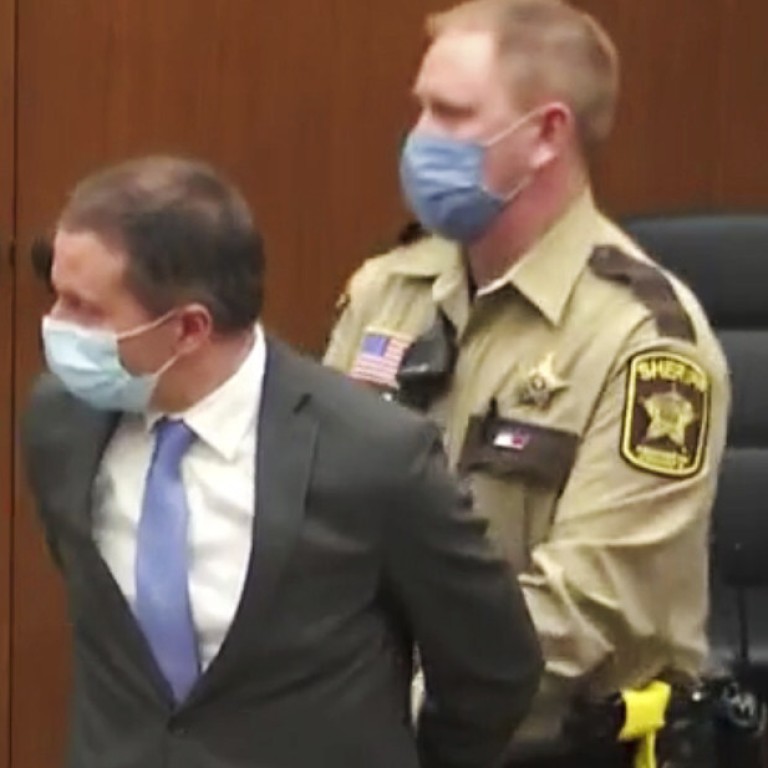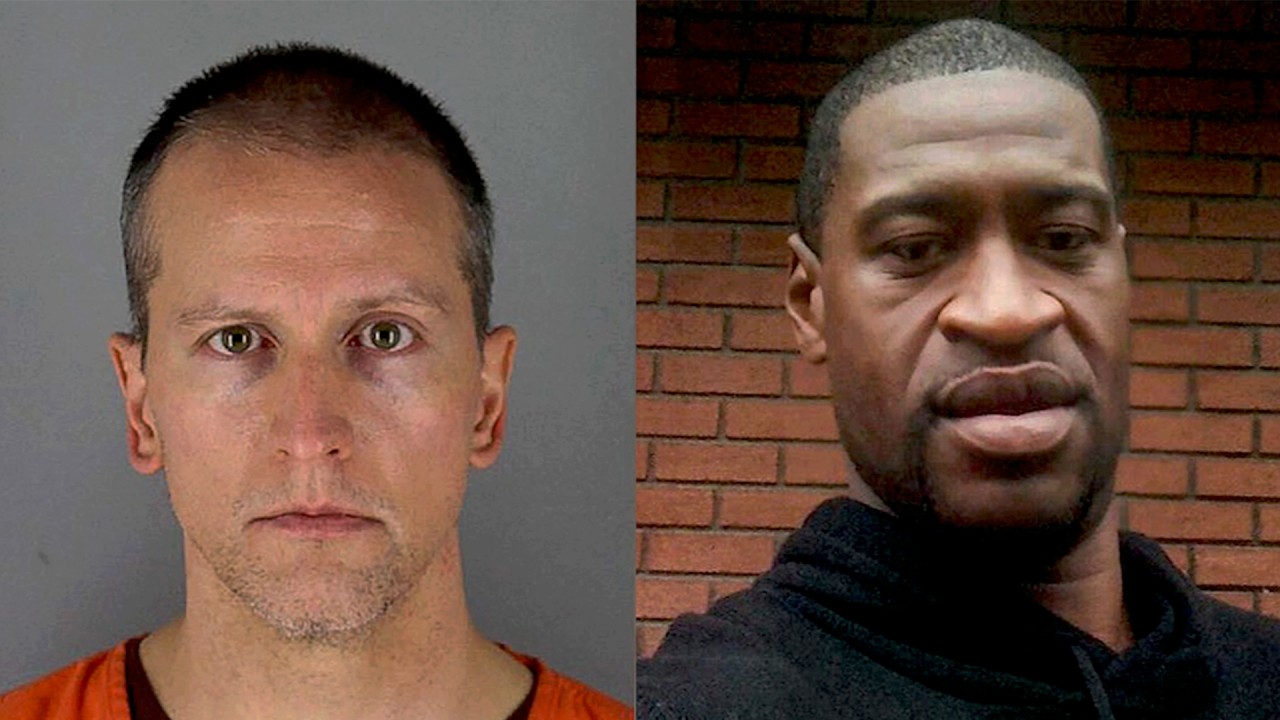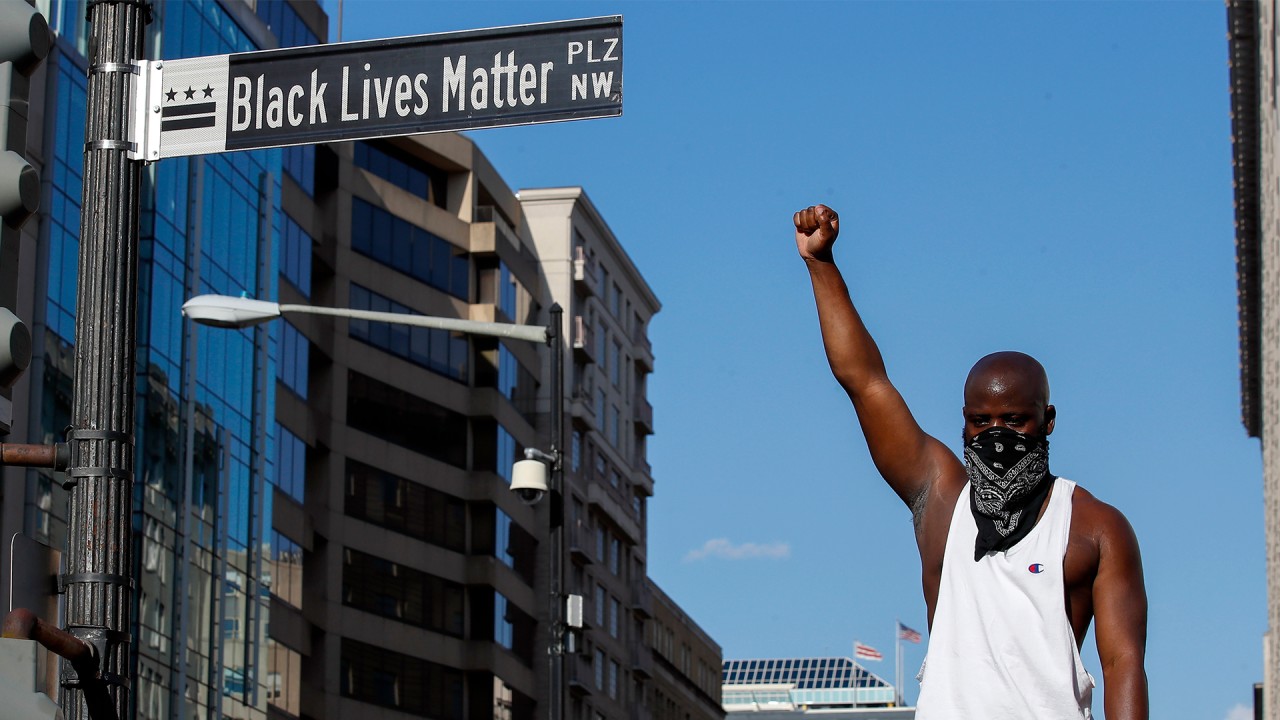
Derek Chauvin found guilty of all charges in murder of George Floyd
- Floyd died after Chauvin pinned him to the pavement with his knee, in an incident that sparked mass protests against racism and police brutality
- President Joe Biden said the entire country must confront hatred to ‘change hearts and minds as well as laws and policies’
Chauvin, 45, was immediately led away with his hands cuffed behind his back and could be sent to prison for decades.
The verdict – guilty on all counts, in a clear-cut victory for Floyd’s supporters – set off jubilation tinged with sorrow around the city. Hundreds of people poured into the streets, some running through traffic with banners. Cars blared their horns.
“Today, we are able to breathe again,” Floyd’s younger brother Philonise said at a joyous family news conference where tears streamed down his face as he likened Floyd to the 1955 Mississippi lynching victim Emmett Till, except that this time there were cameras around to show the world what happened.
The jury of six white and six black or multiracial people came back with its verdict after about 10 hours of deliberations over two days.
The now-fired white officer was found guilty as charged of second-degree unintentional murder, third-degree murder and second-degree manslaughter.
His face was obscured by a Covid-19 mask, and little reaction could be seen beyond his eyes darting around the courtroom. His bail was immediately revoked. Sentencing will be in two months; the most serious charge carries up to 40 years in prison.
Defense lawyer Eric Nelson followed Chauvin out of the courtroom without comment.

Biden spoke from the White House hours after the ruling alongside Vice-President Kamala Harris, with the pair saying the country’s work is far from finished with the verdict.
“We can’t stop here,” Biden declared.
Biden and Harris called on Congress to act swiftly to address policing reform, including by approving a bill named for Floyd. Beyond that, the president said, the entire country must confront hatred to “change hearts and minds as well as laws and policies.”
“‘I can’t breathe.’ Those were George Floyd’s last words,” Biden said. “We can’t let those words die with him. We have to keep hearing those words. We must not turn away. We can’t turn away.”
Harris said racism was keeping the country from fulfilling its founding promise of “liberty and justice for all.”
“It is not just a black America problem or a people of colour problem. it is a problem for every American,” she said. “It is holding our nation back from reaching our full potential.”
“A measure of justice isn’t the same as equal justice,” she said.
Biden addressed the nation after telephoning Floyd’s family following the verdict, telling them, “We’re all so relieved.” He added later that he sought to comfort Floyd’s young daughter Gianna, telling her, “Daddy did change the world.”
Floyd family lawyer Ben Crump posted video of the call on Twitter.
Chicago releases shocking video of police shooting 13-year-old boy dead
Crowds nationwide reacted to the verdict with jubilation but also with deep awareness of the progress left to be made.
“It means so much to me,” said Venisha Johnson, a black woman who cried at a gathering in what’s been dubbed George Floyd Square as the verdict was read. “I’ve been praying for George every day, every morning at 6am. I’m just so happy. The way he was murdered was terrible! But thank you, Jesus.”
Many who watched the trial that followed saw the verdict as a first small step to address centuries of racist policing in a nation founded on slavery. Some say they had prepared themselves for a different, and devastating, outcome.
“We are relieved but not celebrating because the killing continues,” the Reverend Jesse Jackson, who travelled to Minneapolis for the verdict, said in a telephone interview. “We hope this is the breaking point to stop legal lynching.”
Former president Barack Obama said in a statement that true justice requires Americans to understand that “black Americans are being treated differently every day” and that millions live in fear that their next encounter with law enforcement could be their last.

At the intersection where Floyd was pinned down, a crowd chanted, “One down, three to go!” – a reference to the three other fired Minneapolis officers facing trial in August on charges of aiding and abetting murder in Floyd’s death.
Tuesday’s verdict was read in a courthouse ringed with concrete barriers and razor wire and patrolled by National Guard troops, in a city on edge against another round of unrest – not just because of the Chauvin case but because of the deadly police shooting of a young black man, Daunte Wright, in a Minneapolis suburb on April 11.
The jurors’ identities were kept secret and will not be released until the judge decides it is safe to do so.
Daunte Wright death: Minnesota officer Kim Potter charged with manslaughter
Floyd, 46, died May 25 after being arrested on suspicion of passing a counterfeit US$20 bill for a pack of cigarettes at a corner market. He panicked, pleaded that he was claustrophobic and struggled with police when they tried to put him in a squad car. They put him on the ground instead.
The centrepiece of the case was the excruciating bystander video of Floyd gasping repeatedly, “I can’t breathe” and onlookers yelling at Chauvin to stop as the officer pressed his knee on or close to Floyd’s neck for what authorities say was 9½ minutes. Floyd slowly went silent and limp.
Prosecutors played the footage at the earliest opportunity, during opening statements, with Jerry Blackwell telling the jury: “Believe your eyes.” And it was shown over and over, analysed one frame at a time by witnesses on both sides.
In the wake of Floyd’s death, demonstrations and scattered violence broke out in Minneapolis, around the country and beyond. The furore also led to the removal of Confederate statues and other offensive symbols such as Aunt Jemima.
In the months that followed, numerous states and cities restricted the use of force by police, revamped disciplinary systems or subjected police departments to closer oversight.
The “Blue Wall of Silence” that often protects police accused of wrongdoing crumbled after Floyd’s death: the Minneapolis police chief quickly called it “murder” and fired all four officers, and the city reached a staggering US$27 million settlement with Floyd’s family as jury selection was under way.
Police-procedure experts and law enforcement veterans inside and outside the Minneapolis department, including the chief, testified for the prosecution that Chauvin used excessive force and went against his training.
Minneapolis to pay George Floyd’s family US$27 million to settle civil lawsuit
Medical experts for the prosecution said Floyd died of asphyxia, or lack of oxygen, because his breathing was constricted by the way he was held down on his stomach, his hands cuffed behind him, a knee on his neck and his face jammed against the ground.
Chauvin lawyer Eric Nelson called a police use-of-force expert and a forensic pathologist to help make the case that Chauvin acted reasonably against a struggling suspect and that Floyd died because of an underlying heart condition and his illegal drug use.
Floyd had high blood pressure, an enlarged heart and narrowed arteries, and fentanyl and methamphetamine were found in his system.
Under the law, police have certain leeway to use force and are judged according to whether their actions were “reasonable” under the circumstances.

The defence also tried to make the case that Chauvin and the other officers were hindered in their duties by what they perceived as a growing, hostile crowd.
Chauvin did not testify, and all that the jury or the public ever heard by way of an explanation from him came from a police body-camera video after an ambulance had taken Floyd away. Chauvin told a bystander: “We gotta control this guy ’cause he’s a sizeable guy … and it looks like he’s probably on something.”
The prosecution’s case also included tearful testimony from onlookers who said the police kept them back when they protested what was happening. Eighteen-year-old Darnella Frazier, who shot the crucial video, said Chauvin just gave the bystanders a “cold” and “heartless” stare.
Chauvin unmoved as crowd begged him to take knee off George Floyd’s neck, court hears
She and others said they felt a sense of helplessness and lingering guilt from witnessing Floyd’s slow-motion death.
“It’s been nights I stayed up, apologising and apologising to George Floyd for not doing more, and not physically interacting and not saving his life,” Frazier testified, while the 19-year-old cashier at the neighbourhood market, Christopher Martin, lamented that “this could have been avoided” if only he had rejected the suspect US$20 bill.
To make Floyd more than a crime statistic in the eyes of the jury, the prosecution called to the stand his girlfriend, who told the story of how they met and how they struggled with addiction to opioids, and his younger brother Philonise.
He recalled how Floyd helped teach him to catch a football and made “the best banana mayonnaise sandwiches”.



